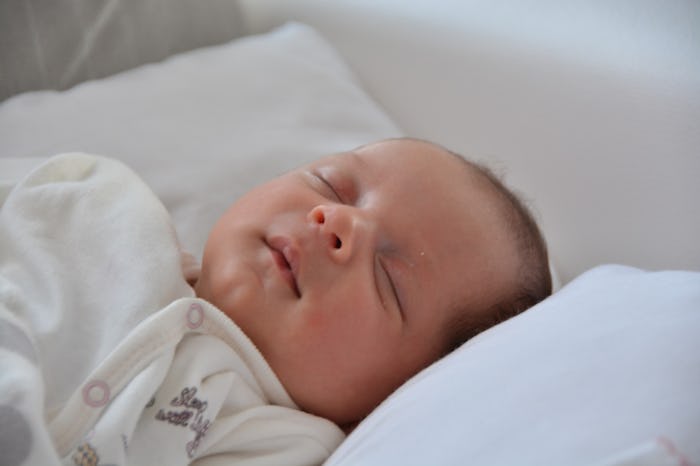Life
Is It OK If My Baby Twitches In Their Sleep? Their Brain’s Working Overtime
I don’t know of anyone who hasn’t had that dream where they’re falling and suddenly, they jerk awake from a dead sleep, their body popping (what feels like) 3 feet into the air. Or, if you’re like my husband, the sudden jerking involves a swift and powerful arm movement — right into my side, chest, face, or stomach, while he’s none the wiser. (Thanks, love.) But what about your baby? Have you noticed their little limbs or face twitching in their sleep? You're probably wondering, "Is it OK if my baby twitches in their sleep?"
Don’t fret, it’s really not unusual for babies to twitch or jerk in their sleep, Dr. Jennifer Trachtenberg, a pediatrician and contributor to The Bump tells Romper in an email interview. "Babies have an immature and still developing nervous system that seems to be triggered more often during the REM sleep stage than when awake," she says. "These twitches during sleep may be baby’s way of improving their sensorimotor connections."
Dr. Wei-Shin Lai, a family physician with a special interest in sleep agrees, telling Romper, "Babies, unlike adults, are developing in every single way, especially in their brains. There are control mechanisms that adults have to prevent us from acting out our dreams or talking too much in our sleep. In babies, those mechanisms are not as well developed. That's why they talk more and move more while sleeping."
Baby twitches while they’re sleeping can also be brought on by loud noises and other stimuli happening around them. Don’t you twitch or jerk awake when you hear a loud noise (or when your husband hits you in the face with his arm while he's sleeping)?
So when should you worry? When is the twitching not OK? Trachtenberg says that the twitches should stop immediately after the baby wakes up. "If a baby has jerking movements that are one sided, that continue to occur during wakefulness, occur for many minutes, or if baby turns blue, these are all more serious signs that the baby needs to be evaluated by their physician or the ER," she says.
Lai says that if it is a seizure, the twitching will be accompanied with other scary signs like jaw clenching, bed wetting, or extreme difficulty in waking your baby up. However, "More often than not, seizures would occur both during sleep and during the day," she says.
Don’t worry, mom. Enjoy watching your baby smile and coo in their sleep, and know that their twitching isn’t serious. Only when it’s prolonged, happens while they're awake, or is combined with other dangerous symptoms should you worry.
